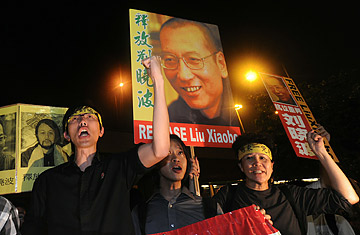
Protestors demonstrate to free Liu Xiaobo, who won the 2010 Nobel Peace Prize, near the China Liason Office in Hong Kong on October 8, 2010. Despite a warning to the Nobel committee and months of behind-the-scenes pressure, China failed to avert a harsh slap in the face — the awarding of the Peace Prize to jailed dissident Liu Xiaobo. Beijing predictably slammed the win for the 54-year-old Liu — the co-author of a bold manifesto calling for political reform who was jailed in December for 11 years for subversion, a sentence that won global condemnation.
(3 of 3)
What really matters for the future, however, is less the opinion of a few Norwegians and more that of millions of Chinese. There's no question that Chinese today enjoy more personal freedoms and fatter pocketbooks than they did a decade ago. This undeniable success is what keeps the party in power, with its leaders arguing that it is the only institution adept enough to manage China's transition to great-power status without the kind of nation-cleaving chaos that has afflicted the country in centuries past.
Yet making all due allowance for the appeal of stability—not to be underestimated if you know anything about modern Chinese history—there is something frankly perplexing about the vehement reaction of the government to perceived slights like Liu's prize. (Poor little Norway bore the brunt of the fury; its Fisheries Minister, who had traveled to Shanghai to mark 21 years of salmon exports to China, had her official meetings canceled.) China's leadership may be managing its economy with a skill that wins deserved plaudits around the world, but its handling of political controversy is nowhere near as mature, demonstrating a bullying insecurity. "The default response here is always one predicated on the fear of looking weak both at home and abroad," says Russell Leigh Moses, a Beijing-based analyst. True enough; while China's Premier Wen Jiabao told Time's Fareed Zakaria on CNN that "freedom of speech is indispensable for any country," that passage of the interview never made it into the state-controlled press—though a group of party elders has just issued an open letter calling for an end to censorship.
In the coming days, as the news of Lui's award spreads across the country, it is the opinion of ordinary Chinese that will matter most. Will they buy the government line that Liu is a troublemaker and criminal? Will they dismiss the prize as an imperialist attempt to impose Western values on China, as yet another way in which the world wants to contain China's march to global supremacy? Or will they secretly thrill to the fact that a Chinese living in his homeland has been so honored? Each year, even as China booms, the number of demonstrations grows. Whether middle-class city dwellers protesting polluting factories or farmers challenging corrupt local chieftains who appropriate their land without proper compensation, the protesters aren't crazy lawbreakers railing for violent overthrow of the regime. They are, rather, ordinary citizens who have reached a level of comfort that they want to protect.
At the least, the Nobel gives Chinese a chance to imagine a country not defined by rulers whose instinct is to denounce anyone seen as threatening their power. Perry Link, a China expert at the University of California at Riverside, who helped Liu translate Charter 08 into English, argues that the biggest benefit of the prize is that it will help "millions of Chinese, both inside China and around the world, to see and feel more clearly that China can be much more than the Chinese Communist Party."
Liu's friends, to be sure, are realistic about how long it may take for his activism to be understood at home. He Yang, a documentary filmmaker who was detained along with others at the celebratory party in Beijing, is now under house arrest. The restrictions are something that dissidents in China have learned to put up with. "Later on, more people will learn [about Liu]," He says. "They will learn that not everyone in China just wants to earn money. They will learn that some people are willing to speak up."
